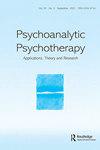The health insurance system and psychoanalytic psychotherapy in Japan: the association with evidence-based practice
IF 1.2
Q1 PSYCHOLOGY, PSYCHOANALYSIS
引用次数: 1
Abstract
Since 1958, the Japanese public health insurance system has covered psychoanalytic psychotherapy. Although it is called ‘standard-type psychoanalytic therapy’, it is essentially psychoanalytic psychotherapy or psychodynamic psychotherapy performed face-to-face once a week. Japan has two psychoanalytical organisations: the Japan Psychoanalytic Society (JPS) and the Japan Psychoanalytical Association (JPA), both established in 1955. Until they separated in 1980, they were one organisation that worked together to secure government approval for medical insurance coverage of psychoanalytic psychotherapy and contributed to training psychiatrists and clinical psychologists in psychoanalytic psychotherapy. Currently, less than 1% of psychiatrists and clinical psychologists in the country have undergone JPA or JPS training. Psychoanalytic psychotherapy provision nationally is difficult because psychoanalytic psychotherapists are concentrated in urban centres. Recent global trends have prompted the demand for evidence-based practice (EBP). To date, the effectiveness of psychoanalytic psychotherapy has not been demonstrated in Japan. Therefore, it is not recognised as an EBP within national measures for public mental health. However, psychoanalytic psychotherapy is essentially an ‘experience-based practice’, even though it is fundamentally different from EBP. Nevertheless, to sustain psychoanalytic psychotherapy as a viable psychotherapy in Japan, it would need to meet EBP standards.日本的健康保险制度和精神分析心理治疗:与循证实践的联系
自1958年以来,日本的公共健康保险制度涵盖了精神分析心理治疗。虽然它被称为“标准型精神分析疗法”,但本质上是每周面对面进行一次的精神分析心理治疗或心理动力心理治疗。日本有两个精神分析组织:日本精神分析学会(JPS)和日本精神分析协会(JPA),均成立于1955年。在1980年分离之前,他们一直是一个共同努力确保政府批准精神分析心理治疗医疗保险的组织,并致力于培训精神病学家和临床心理学家进行精神分析心理疗法。目前,该国只有不到1%的精神科医生和临床心理学家接受过JPA或JPS培训。在全国范围内提供心理分析心理治疗是困难的,因为心理分析心理治疗师集中在城市中心。最近的全球趋势推动了对循证实践的需求。迄今为止,精神分析心理治疗的有效性尚未在日本得到证实。因此,在国家公共心理健康措施中,它不被视为EBP。然而,精神分析心理治疗本质上是一种“基于经验的实践”,尽管它与EBP有根本的不同。然而,要在日本维持精神分析心理治疗作为一种可行的心理治疗,它需要符合EBP标准。
本文章由计算机程序翻译,如有差异,请以英文原文为准。
求助全文
约1分钟内获得全文
求助全文
来源期刊

Psychoanalytic Psychotherapy
PSYCHOLOGY, PSYCHOANALYSIS-
CiteScore
1.30
自引率
37.50%
发文量
22
期刊介绍:
Psychoanalytic Psychotherapy publishes original contributions on the application, development and evaluation of psychoanalytic ideas and therapeutic interventions in the public health sector and other related applied settings. The Journal aims to promote theoretical and applied developments that are underpinned by a psychoanalytic understanding of the mind. Its aims are consonant with those of the Association for Psychoanalytic Psychotherapy in the NHS (APP in the NHS) in promoting applied psychoanalytic work and thinking in the health care system, across the whole age range.
 求助内容:
求助内容: 应助结果提醒方式:
应助结果提醒方式:


